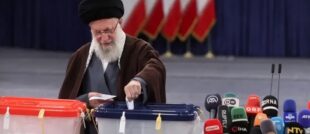Iranwire – As Iran’s presidential election kicked off on June 28, the day was marked by several controversies and technical challenges.
The election headquarters spokesperson announced a ban on publishing images of ballot papers, citing Article 10 of the Presidential Election Law, which mandates secret voting.
Despite this prohibition, some social media users shared pictures of their ballots following an earlier call by Mehdi Rouhanifar, a member of reformist candidate Masoud Pezeshkian’s campaign.
The action echoed similar incidents from the 2009 election.
Reports emerged of mobile phones being prohibited in various polling stations to prevent ballot photography.
Simultaneously, there were accounts of protesters chanting “Death to the hypocrite” against Pezeshkian at the Shah Abdol-Azim Shrine.
Conservative candidate Saeed Jalili also faced criticism from some revolutionary forces for lack of consensus within the conservative camp.
Adding to the day’s complexity, Minister of Communications Isa Zarepour reported seven cases of “deliberate sabotage” to fiber optic lines across Iran.
Despite these hurdles, which involved digging up to two meters in some cases, Zarepour assured that communication teams swiftly restored connections.
The minister stated that over 700,000 kilometers of optical fiber lines were being monitored to ensure smooth election proceedings.
He reported that “99.9 percent” of the 58,600 polling branches were connected, with the remaining few expected to be mobile units.
Iran opened polls on Friday for its 14th presidential election following the death of President Ebrahim Raisi in a helicopter crash last month.
The contenders are Saeed Jalili, Mohammad Bagher Ghalibaf, and Mostafa Pourmohammadi from the fundamentalist faction, while Masoud Pezeshkian represents the reformist movement.
Two candidates, Amirhossein Ghazizadeh Hashemi and Alireza Zakani, withdrew from the race to consolidate fundamentalist support.
Despite expectations, neither Ghalibaf nor Jalili stepped down in favor of the other.
 Shabtabnews In this dark night, I have lost my way – Arise from a corner, oh you the star of guidance.
Shabtabnews In this dark night, I have lost my way – Arise from a corner, oh you the star of guidance.



